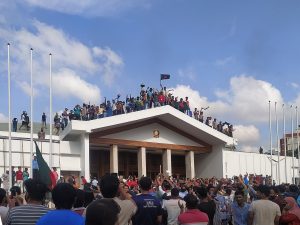“One, two, three, four, Sheikh Hasina, dictator,” shouted protestors on the streets of Dhaka in recent weeks. Such slogans would have been unimaginable in Bangladesh even a few months ago, given the iron grip of Prime Minister Sheikh Hasina over power since 2009.
In January this year, Hasina’s Awami League swept elections, thanks to widespread manipulation of the vote and the exclusion of the opposition Bangladesh Nationalist Party (BNP).
It took four rigged electoral processes that the AL won, endemic corruption (durniti in the Bengali language), “justice” meted out at the behest of those in power, and multiple vulnerability traps (economic, social and climate) that Bangladesh is caught in for the Hasina regime to fall like a house of cards.
Political violence being endemic since the creation of Bangladesh in 1971, it took more than 300 deaths, thousands of people injured and others taken into custody, and an unknown number of summary executions and forced disappearances for the youth protests, first organized against the unfair allocation of quotas in the public service, to reduce to dust this hegemonic power.
As the daughter of Sheikh Mujibur Rahman, the leader of Bangladesh’s independence, Hasina locked herself into a quasi-messianic image as the “Daughter of Democracy.” She wanted to preserve, at whatever the price, the political and historical legacy of her father by not allowing any dispute over the role of the latter, putting in jeopardy the freedom of expression by heavy criminal sanction.
She, therefore, sought to impose a single vision of the history of Bangladesh (“One Party, One History, One Narrative”), with totalitarian overtones, while imposing red lines on freedom of expression.
Beyond physical political violence, Hasina also endorsed violence in her speeches. “Do not torture when it is unnecessary,” she declared on April 26, 2017, in front of an audience of representatives of the Rapid Action Battalion, a civil-military force under her command that was created in 2004. In essence, she was endorsing torture when “necessary.”
This symbolic violence was also illustrated by a very arrogant narrative.
On September 7, 2023, Hasina asked Bangladesh’s ethnic and religious minorities to stop portraying themselves as “victims.” A few weeks ago, she compared the students demonstrating against the quota system for the allocation of positions in the civil service to “Razakars,” a strong Bengali term that refers to fighters who were against the independence of Bangladesh and who fought alongside Pakistani forces.
It is therefore not surprising that these same demonstrators attacked the symbols of this state violence such as the house of the former Home Minister Asaduzzaman Khan, and houses of Awami League members. The statues of Sheikh Mujibur Rahman were burnt. Very illustrative of the former regime’s symbols, the Bangabandhu Memorial Museum, dedicated to the political and historical legacy of Sheikh Mujibur Rahman, was burned down on August 5.
Bangladeshi society today thirsts for justice — economic justice, social justice, and criminal justice. This is important for the country to be rebuilt in a way that responds to the aspirations of Bangladeshi citizens. This is a country that is facing multiple crises, including an economic crisis, a looming crisis due to climate change and rising water levels, which could result in the loss of 20 percent of its territory by 2050.
The Bangladesh military wishes to organize the transition of power without directly participating in it. It faces massive challenges.
The interim government must first focus on healing the wounds of direct and indirect victims of the Hasina regime while organizing a political transition by dealing with the opposition forces that have been severely undermined over the past 15 years. Within this period of transition, there are two major stakes ahead: the reform of the security sector, in particular the police and the myriad of security intelligence services, as well as a reflection around avenues to organize transitional justice in order to answer to the thirsts for justice for many Bangladeshis citizens.
The success of this political transition that may last will first and foremost depend on the desire and willingness of Bangladeshi society to unite and show solidarity while overcoming social divisions and clientelist practices.

































